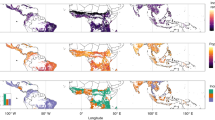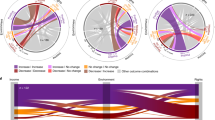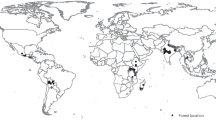Abstract
Payments for Ecosystem Services (PES) represent a popular strategy for environmental protection, and tropical forest conservation in particular. Little is known, however, about their effectiveness. Many argue that even if PES increase conservation while payments last, they may adversely affect other motivations for pro-environmental behaviour in the longer term. We test whether conditional payments also encourage forest users to conserve shared forest resources after payments end. Using a framed field experiment with 1,200 tropical forest users in five countries, we show that (1) during the intervention, conditional payments increased conservation behaviour; (2) after payments stopped, users continued to conserve more on average than they did before the intervention, especially when they were able to communicate with each other; and (3) trust amplified the lasting conservation effects of the interventions. PES effectiveness may increase when interventions facilitate interpersonal communication and when implemented in contexts where forest users enjoy high levels of trust.
This is a preview of subscription content, access via your institution
Access options
Access Nature and 54 other Nature Portfolio journals
Get Nature+, our best-value online-access subscription
$29.99 / 30 days
cancel any time
Subscribe to this journal
Receive 12 digital issues and online access to articles
$119.00 per year
only $9.92 per issue
Buy this article
- Purchase on Springer Link
- Instant access to full article PDF
Prices may be subject to local taxes which are calculated during checkout


Similar content being viewed by others
References
Kinzig, A. P. et al. Paying for ecosystem services: Promise and peril. Science 334, 603–604 (2011).
Wunder, S., Engel, S. & Pagiola, S. Taking stock: A comparative analysis of payments for environmental services programs in developed and developing countries. Ecol. Econ. 65, 834–852 (2008).
Pattanayak, S. K., Wunder, S. & Ferraro, P. J. Show me the money: Do payments supply environmental services in developing countries? Rev. Env. Econ. Policy 4, 254–274 (2010).
Ezzine-de-Blas, D., Wunder, S., Ruiz-Pérez, M. & Moreno-Sanchez, R. D. P. Global patterns in the implementation of payments for environmental services. PLoS ONE 11, e0149847 (2016).
Alston, L. J., Andersson, K. & Smith, S. M. Payment for environmental services: Hypotheses and evidence. Annu. Rev. Resour. Econ. 5, 139–159 (2013).
Daniels, A. E., Bagstad, K., Esposito, V., Moulaert, A. & Rodriguez, C. M. Understanding the impacts of Costa Rica’s PES: Are we asking the right questions? Ecol. Econ. 69, 2116–2126 (2010).
Sánchez-Azofeifa, G. A., Pfaff, A., Robalino, J. A. & Boomhower, J. P. Costa Rica’s payment for environmental services program: Intention, implementation, and impact. Conserv. Biol. 21, 1165–1173 (2007).
Ostrom, E. The challenge of common-pool resources. Environ.: Sci. Policy Sustain. Dev. 50, 8–21 (2008).
Fisher, B., Kulindwa, K., Mwanyoka, I., Turner, R. K. & Burgess, N. D. Common pool resource management and PES: Lessons and constraints for water PES in Tanzania. Ecol. Econ. 69, 1253–1261 (2010).
Travers, H., Clements, T., Keane, A. & Milner-Gulland, E. J. Incentives for cooperation: The effects of institutional controls on common pool resource extraction in Cambodia. Ecol. Econ. 71, 151–161 (2011).
Who Owns the World’s Land? A Global Baseline of Formally Recognized Indigenous and Community Land Rights (Rights and Resources Initiative, 2015).
Vatn, A. An institutional analysis of payments for environmental services. Ecol. Econ. 69, 1245–1252 (2010).
Muradian, R., Corbera, E., Pascual, U., Kosoy, N. & May, P. H. Reconciling theory and practice: An alternative conceptual framework for understanding payments for environmental services. Ecol. Econ. 69, 1202–1208 (2010).
Agrawal, A., Chhatre, A. & Gerber, E. R. Motivational crowding in sustainable development interventions. Am. Political Sci. Rev. 109, 470–487 (2015).
Titmuss, R. The gift of blood. Trans.-Action 8, 18–26 (1971).
Frey, B. S. How intrinsic motivation is crowded out and in. Ration. Soc. 6, 334–352 (1994).
Deci, E. L., Koestner, R. & Ryan, R. M. A meta-analytic review of experiments examining the effects of extrinsic rewards on intrinsic motivation. Psychol. Bull. 125, 627–668 (1999).
Jack, B. K., Kousky, C. & Sims, K. R. E. Designing payments for ecosystem services: Lessons from previous experience with incentive-based mechanisms. Proc. Natl Acad. Sci. USA 105, 9465–9470 (2008).
Ostrom E. Governing the Commons: The Evolution of Institutions for Collective Action (Cambridge University Press, New York, 1990).
Cardenas, J. C., Stranlund, J. & Willis, C. Local environmental control and institutional crowding-out. World Dev. 28, 1719–1733 (2000).
Andersson, K., Benavides, J. P. & León, R. Institutional diversity and local forest governance. Environ. Sci. Policy 36, 61–72 (2014).
Vollan, B. Socio-ecological explanations for crowding-out effects from economic field experiments in southern Africa. Ecol. Econ. 67, 560–573 (2008).
Salk, C., Lopez, M.-C. & Wong, G. Simple incentives and group dependence for successful payments for ecosystem services programs: Evidence from an experimental game in rural Lao PDRConserv. Lett. 10, 414–421 (2017).
Heyman, J. & Ariely, D. Effort for payment: A tale of two markets. Psychol. Sci. 15, 787–793 (2004).
Bowles, S. Policies designed for self-interested citizens may undermine the moral sentiments: Evidence from economic experiments. Science 320, 1605–1609 (2008).
Yamagishi, T. The provision of a sanctioning system as a public good. J. Personal. Social. Psychol. 51, 110–116 (1986).
Levi, M. & Stoker, L. Political trust and trustworthiness. Annu. Rev. Political Sci. 3, 475–507 (2000).
Ostrom, E. & Ahn, T. K. in Foundations of Social Capital (eds Ostrom, E. & Ahn, T. K) Introduction (Edward Elgar, Cheltenham, UK, 2003).
Hardin, R. Trust (Polity, Cambridge, UK, 2006).
Delhey, J. & Newton, K. Predicting cross-national levels of social trust: Global pattern or nordic exceptionalism? Eur. Sociol. Rev. 21, 311–327 (2005).
Parks, C. D., Joireman, J. & Van Lange, P. A. M. Cooperation, trust, and antagonism: How public goods are promoted. Psychol. Sci. Public Interest 14, 119–165 (2013).
Wason, P. C. Reasoning about a rule. Q. J. Exp. Psychol. 20, 273–281 (1968).
Darley, J. M. & Gross, P. H. A hypothesis-confirming bias in labeling effects. J. Personal. Social. Psychol. 44, 20–33 (1983).
Nickerson, R. S. Confirmation bias: A ubiquitous phenomenon in many guises. Rev. General. Psychol. 2, 175–220 (1998).
Fischbacher, U. & Gächter, S. Social preferences, beliefs, and the dynamics of free riding in public goods experiments. Am. Econ. Rev. 100, 541–556 (2010).
Ostrom,E., Gardner, R. & Walker, J. Rules, Games, and Common-Pool Resources (University of Michigan Press, Ann Arbor, 1994).
Blanco, E., Lopez, M. C. & Walker, J. M. The opportunity costs of conservation with deterministic and probabilistic degradation externalities. Environ. Resour. Econ. 64, 255–273 (2016).
Persha, L., Agrawal, A. & Chhatre, A. Social and ecological synergy: Local rulemaking, forest livelihoods, and biodiversity conservation. Science 331, 1606–1608 (2011).
Vatn, A. Resource regimes and cooperation. Land Use Policy 24, 624–632 (2007).
Rode, J., Gómez-Baggethun, E. & Krause, T. Motivation crowding by economic incentives in conservation policy: A review of the empirical evidence. Ecol. Econ. 117, 270–282 (2015).
Kaczan, D. J. & Swallow, B.M. Forest conservation policy and motivational crowding: Experimental evidence from Tanzania. Ecol. Econ. https://doi.org/10.1016/j.ecolecon.2016.07.002 (in press).
Handberg, Ø. N. & Angelsen, A . Pay little, get little; pay more, get a little more: A framed forest experiment in Tanzania. Ecol. Econ. https://doi.org/10.1016/j.ecolecon.2016.09.025 (in press).
Newton, P., Miller, D. C., Byenkya, M. A. A. & Agrawal, A. Who are forest-dependent people? A taxonomy to aid livelihood and land use decision-making in forested regions. Land Use Policy 57, 388–395 (2016).
State of the World’s Forests (Food and Agriculture Organization, Rome, 2003).
Chao S. Forest Peoples: Numbers across the World (Forest Peoples Programme, Moreton-in-Marsh, UK, 2012).
Angelsen, A. et al. Environmental income and rural livelihoods: A global-comparative analysis. World Dev. 64, S12–S28 (2014).
Bjørnskov, C. Determinants of generalized trust: A cross-country comparison. Public Choice 130, 1–21 (2007).
Andersson, K. & Agrawal, A. Inequalities, institutions, and forest commons. Glob. Environ. Change 21, 866–875 (2011).
Henrich, J., Heine, S. J. & Norenzayan, A. Most people are not WEIRD. Nature 466, 29–29 (2010).
Alston, L. J. & Andersson, K. Reducing greenhouse gas emissions by forest protection: The transaction costs of implementing REDD. Clim. Law 2, 218–289 (2011).
Janssen, M. A., Holahan, R., Lee, A. & Ostrom, E. Lab experiments for the study of social-ecological systems. Science 328, 613–617 (2010).
Bochet, O., Page, T. & Putterman, L. Communication and punishment in voluntary contribution experiments. J. Econ. Behav. Organ. 60, 11–26 (2006).
Ostrom, E., Walker, J. & Gardner, R. Covenants with and without a sword: Self-governance is possible. Am. Polit. Sci. Rev. 86, 404–417 (1992).
Henrich, J. et al. Markets, religion, community size, and the evolution of fairness and punishment. Science 327, 1480–1484 (2010).
Acknowledgements
We thank A. Agrawal, R. Chazdon, P. Magnuszewski, J. Menken, P. Newton, M. Pajak, S.M. Smith, J. Stefanska, M. Trautmann and P. Valdivieso for constructive comments on earlier drafts of the paper. We also thank L. Schultz for valuable editorial assistance. The research was supported by the National Science Foundation (grants DEB-1114984, BCS-1115009 and SMA-328688), as well as the Center for International Forestry Research (through grants from the European Commission and the UK Department for International Development).
Author information
Authors and Affiliations
Contributions
K.P.A., C.F.S. and G.D.W. conceived of the project, M.C.L., K.P.A., C.F.S. and E.M. designed the experiments, M.C.L. and E.M. conducted the experiments, N.J.C. and T.G. developed the analysis approach, N.J.C. analysed the data and K.P.A., T.G. and N.J.C. wrote the paper.
Corresponding author
Ethics declarations
Competing interests
The authors declare no competing interests.
Additional information
Publisher’s note: Springer Nature remains neutral with regard to jurisdictional claims in published maps and institutional affiliations.
Supplementary information
Supplementary Information
Supplementary Discussion, Methods and References, plus Supplementary Tables 1–10 and Supplementary Figures 1–3
Supplementary Data File
Two datasets, Balance test script, R script, guide to the data files
Rights and permissions
About this article
Cite this article
Andersson, K.P., Cook, N.J., Grillos, T. et al. Experimental evidence on payments for forest commons conservation. Nat Sustain 1, 128–135 (2018). https://doi.org/10.1038/s41893-018-0034-z
Received:
Accepted:
Published:
Issue Date:
DOI: https://doi.org/10.1038/s41893-018-0034-z
This article is cited by
-
Confronting sustainable intensification with uncertainty and extreme values on smallholder tropical farms
Sustainability Science (2022)
-
Effectiveness of payment for ecosystem services after loss and uncertainty of compensation
Nature Sustainability (2021)
-
Participatory policies and intrinsic motivation to conserve forest commons
Nature Sustainability (2020)
-
The impacts of collective threshold requirements for rewards in a CPR experiment
Environmental Economics and Policy Studies (2020)
-
Gender quotas increase the equality and effectiveness of climate policy interventions
Nature Climate Change (2019)



